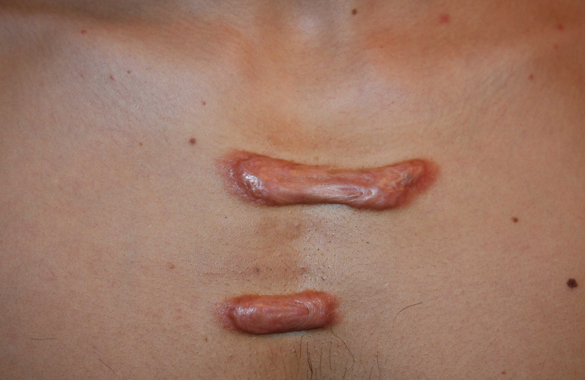Quick Inquiry


Dermasure provides the best keloids treatment in Delhi, as finding the right clinic to treat your disease is very essential for effective and compassionate care. When it comes to treating keloids, Dermasure is the one stop perfect destination for its best treatment. Under the expertise of Dr. Shirin Bakshi’s DermaSure Skin and Hair Clinic, we simplify Keloids treatment by providing advanced therapies according to the patient’s need.

Keloids are non-contagious raised scars. Unlike other raised scars, keloids grow much larger than the wound that caused the scar. It appears as smooth, shiny, and often firm growths that can be pink, red, or dark in colour. They are not harmful or contagious, but they can be aesthetically bothersome and cause discomfort or itchiness for some individuals.
Several Symptoms of Keloids include:
– Raised, thickened areas of scar tissue
– Itchiness or irritation
– Tenderness or pain
– Skin colour changes
– Expansion beyond the original injury site
– Smooth, sparkling appearance on a superficial level
– Conceivable aversion to contact
Most keloids develop in one of these areas:
Anything that causes skin to scar can cause a keloid. If you have keloid-prone skin (not everyone does), this scar may form after:
Keloids can cause distress and self-consciousness. Home remedies may worsen symptoms, making professional treatment essential.
At DermaSure, we diagnose keloids through a comprehensive evaluation. Our focus lies in two key aspects before treatment:
Keloid treatment plans vary based on individual needs. Prioritising patient comfort, we consider factors like age, overall health, and the impact of the condition on your life.
The type, location, and progression of keloids play significant roles. Discover the treatments we offer for keloid patients at Dermasure:
These injections are commonly used to shrink keloids. They provide relief from symptoms and make the keloid feel softer. Around 50% to 80% of keloids show shrinkage after injection, but many may regrow within five years. To enhance the results, additional treatments like keloid surgery or pressure garment use may be recommended.
Surgical excision involves removing the keloid. However, it’s important to note that nearly all keloids have a tendency to return after this treatment. To minimise the risk of recurrence, additional measures such as wearing pressure garments or undergoing cryosurgery may be suggested.
These are often used after keloid surgery to reduce blood flow and prevent keloid regrowth. Compliance with wearing pressure devices is essential for effective results, typically requiring 12 to 20 hours of daily usage for several months. Pressure earrings are generally the most convenient option.
Medical-grade silicone gel sheets can be applied to flatten keloids. They are effective for new keloids or can be used as a preventive measure after an injury to prevent keloid formation.
Cryosurgery is a suitable option for small keloids and can reduce their size and hardness. Cryosurgery can be performed before or after corticosteroid injections to enhance their effectiveness.
Expert Dermatologists: Skilled experts who figure out keloid formation and treatment options.
Progressing Monitoring: Normal subsequent follow-ups to evaluate treatment adequacy and make vital changes.
Precise Assessment: Exhaustive assessments to decide the best treatment approach for every patient.
Advanced Treatment Options: Admittance to a scope of effective treatments, including corticosteroid injections, laser treatment, and surgical options.
There are numerous advantages of choosing Dermasure for keloid treatment. We provide a vast range of treatment options, including laser treatment, all according to the needs of the patient. Dermasure Clinic emphasises comfort and open communication, ensuring a supportive environment for the Keloids treatment in Delhi.
While it may not be possible to completely prevent keloids, there are steps you can take to minimise their risk. Avoiding unnecessary skin trauma, promptly treating acne or other skin conditions, and using proper wound care techniques can help reduce the likelihood of keloid formation. It is also important to seek professional medical advice for appropriate treatment of wounds or injuries.
While a keloid is growing, it can cause pain or discomfort. The pain usually goes away when the keloid stops growing. On rare occasions, keloids can remain tender and painful.
Yes, keloids are treatable. Various keloid treatment options are available to manage and reduce the size of keloids, including steroid injections, silicone sheets or gels, cryotherapy, laser therapy, surgical excision and radiation therapy. The choice of treatment depends on the size, location, and severity of the keloid, as well as individual factors.
Keloids have a tendency to recur even after successful treatment. While treatment can effectively reduce their size and improve their appearance, it is important to follow post-treatment care instructions and have regular follow-up appointments with a dermatologist to monitor the area and address any potential recurrence promptly.
The level of discomfort experienced during keloid treatments may vary depending on the treatment method used and individual pain tolerance. Some treatments, such as steroid injections or laser therapy, may involve mild discomfort, which is usually well-managed with local anaesthesia or numbing creams. Your dermatologist will take measures to ensure your comfort during the procedure.
A keloid scar more often than not develops for months or a long time and gets to be greater than the first wound. Whereas it’s developing, it may feel irritated or excruciating. This as a rule stops once it’s wrapped up developing. In case it’s on or close to a joint, the joint can be awkward or troublesome to move.
Leave Them To #1 Skin & Hair Specialist In Delhi